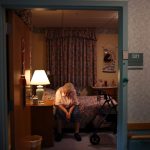Topic
Caregiving
On This Topic
-
Taking care of kids makes balancing work and life harder — particularly for moms, poll finds
The challenge mothers in particular face isn’t new — but it is complex and was only exacerbated by the pandemic. A new 19th News/SurveyMonkey poll sheds light on the issue.
-
Domestic workers, long excluded from labor protections, call for codified rights
Rules governing the workplace have long included exclusions rooted in racism and sexism. But the workers who care for others’ homes and families want those protections, too.
-
Medicaid program expands funding for seniors and people with disabilities, but its future remains uncertain
Medicaid's Money Follows the Person has allowed over 90,000 people with disabilities and seniors to move out of nursing homes and back into their communities. But Congress still won’t make the funding permanent.
-
More students will likely become pregnant post-Roe. Who will support them?
Schools often discriminate against parenting students, and services for them have dwindled. New abortion restrictions could force more young people to drop out.
-
43 percent of parents ‘definitely’ won’t vaccinate their children under 5, survey finds
More than a quarter of parents plan to "wait and see" how the COVID vaccine affects other young children first.
-
COVID continues to hit nursing homes harder, AARP data shows
Cases are surging everywhere, and nursing home residents remain more likely to face severe illness and death.
-
Movies and TV don’t portray how domestic workers really live, new report shows
Advocates say the media misrepresentation negatively impacts how child care workers, house cleaners and others in the workforce are treated in real life.
-
Senate fails to pass breastfeeding law for 9 million working parents despite calls for flexibility amid formula shortage
The PUMP Act failed to pass the Senate Wednesday afternoon. Senators are now eyeing another bill, the Pregnant Workers Fairness Act, which would also expand breastfeeding protections for workers and appears poised to pass soon.
-
Senators are pushing TSA to clarify its rules around breast milk and formula at airport security
Following reports of parents being harassed, breast milk being spoiled and breast pumps being destroyed by TSA agents, 14 Democratic senators are calling on the agency to address its uneven implementation of policies for nursing parents.
-
A tampon shortage, during a formula shortage, during a child care shortage
Addressing the shortages means overcoming not just disregard for people’s needs, but also the discomfort many Americans feel discussing menstruation and other issues affecting women and marginalized groups.









